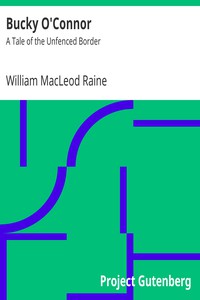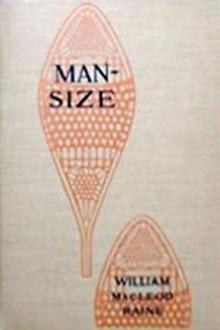Bucky O'Connor: A Tale of the Unfenced Border, William MacLeod Raine [good beach reads .txt] 📗

- Author: William MacLeod Raine
Book online «Bucky O'Connor: A Tale of the Unfenced Border, William MacLeod Raine [good beach reads .txt] 📗». Author William MacLeod Raine
“I don't think anything of the kind,” his hard voice answered. “I think you're a prince, if you want to know.”
She smiled a little wanly, trying to coax him back into friendliness. “Then if I'm a prince you must be a princess,” she teased.
“I meant a prince of good fellows.”
“Oh!” She could be stiff, too, if it came to that.
And at this inopportune moment the key turned harshly and the door swung open.
CHAPTER 12. A CLEAN WHITE MAN'S OPTION
The light of a lantern coming down the steps blinded them for a moment. Behind the lantern peered the yellow face of the turnkey. “Ho, there, Americano! They want you up above,” the man said. “The generals, and the colonels, and the captains want a little talk with you before they hang you, senor.”
The two soldiers behind the fellow cackled merrily at his wit, and the encouraged turnkey tried again.
“We shall trouble you but a little time. Only a few questions, senor, an order, and then poco tiempo, after a short walk to the gallows—paradise.”
“What—what do you mean?” gasped the girl whitely.
“Never mind, muchacho. This is no affair of yours. Your turn will come later. Have no fear of that,” nodded the wrinkled old parchment face.
“But—but he hasn't done anything wrong.”
“Ho, ho! Let him explain that to the generals and the colonels,” croaked the old fellow. “And that you may explain the sooner, senor, hurry—let your feet fly!”
Bucky walked across to the girl he loved and took her hands in his.
“If I don't come back before three hours read the letter that I wrote you yesterday, dear. I have left matches on that bench so that you may have a light. Be brave, pardner. Don't lose your nerve, whatever you do. We'll both get out of this all right yet.”
He spoke in a low voice, so that the guards might not hear, and it was in kind that she answered.
“I'm afraid, Bucky; afraid away down deep. You don't half believe yourself what you say. I can't stand it to be here alone and not know what's going on. They might be—be doing what that man said, and I not know anything about it till afterward.” She broke down and began to sob. “Oh, I know I'm a dreadful little coward, but I can't be like you—and you heard what he said.”
“Sho! What he says is nothing. I'm an American citizen, and I reckon that will carry us through all right. Uncle Sam has awful long arms, and these greasers know it. I'm expecting to come back here again, little pardner. But if I don't make it, I want you, just as soon as they turn you loose, to go straight to your father's ranch.”
“Come! This won't do. Look alive, senor,” the turnkey ordered, and to emphasize his words reached a hand forward to pluck away the sobbing lad. Bucky caught his wrist and tightened on it like a vise. “Hands off, here!” he commanded quietly.
The man gave a howl of pain and nursed his hand gingerly after it was released.
“Oh, Bucky, make him let me go, too,” the girl wailed, clinging to his coat.
Gently he unfastened her fingers. “You know I would if I could, Curly; but it isn't my say-so.”
And with that he was gone. Ashen-faced she watched him go, and as soon as the door had closed groped her way to the bench and sank down on it, her face covered with her hands. He was going to his death. Her lover was going to his death. Why had she let him go? Why had she not done something—thought of some way to save him?
The ranger's guards led him to the military headquarters in the next street from the prison. He observed that nearly a whole company of Rurales formed the escort, and this led him to conclude that the government party was very uneasy as to the situation and had taken precautions against a possible attempt at rescue. But no such attempt was made. The sunny streets were pretty well deserted, except for a few lounging peons hardly interested enough to be curious. The air of peace, of order, sat so incongruously over the plaza that Bucky's heart fell. Surely this was the last place on earth for a revolution to make any headway of consequence. His friends were hidden away in holes and cellars, while Megales dominated the situation with his troops. To expect a reversal of the situation was surely madness.
Yet even while the thought was in his mind he caught a glimpse in a doorway of a man he recognized. It was Rodrigo, one of his allies of the previous night's escapade, and it seemed to him that the man was trying to tell him something with his eyes. If so, the meaning of his message failed to carry home, for after the ranger had passed he dared not look back again.
So far as the trial itself went, O'Connor hoped for nothing and was the less disappointed. One glance at his judges was enough to convince him of the futility of expectation. He was tried by a court-martial presided over by General Carlo. Beside him sat a Colonel Onate and Lieutenant Chaves. In none of the three did he find any room for hope. Carlo was a hater of Americans and a butcher by temperament and choice, Chaves a personal enemy of the prisoner, and Onate looked as grim an old scoundrel as Jeffreys the hanging judge of James Stuart. Governor Megales, though not technically a member of the court, was present, and took an active part in the prosecution. He was a stout, swarthy little man, with black, beady eyes that snapped restlessly to and fro, and from his manner to the officers in charge of the trial it was plain that he was a despot even in his own official family.
The court did not trouble itself with forms of law. Chaves was both principal witness and judge, notwithstanding the protest of the prisoner. Yet what the lieutenant had to offer in the way of testimony was so tinctured with bitterness that it must have been plain to the veriest novice he was no fit judge of the case.
But Bucky knew as well as the judges that his trial was a merely perfunctory formality. The verdict was decided ere it began, and, indeed, so eager was Megales to get the farce over with that several times he interrupted the proceedings to urge haste.
It took them just fifteen minutes from the time the young American was brought into the room to find him guilty of treason and to decide upon immediate execution as the fitting punishment.
General Carlo turned to the prisoner. “Have you anything to say before I pronounce sentence of death upon you?”





Comments (0)